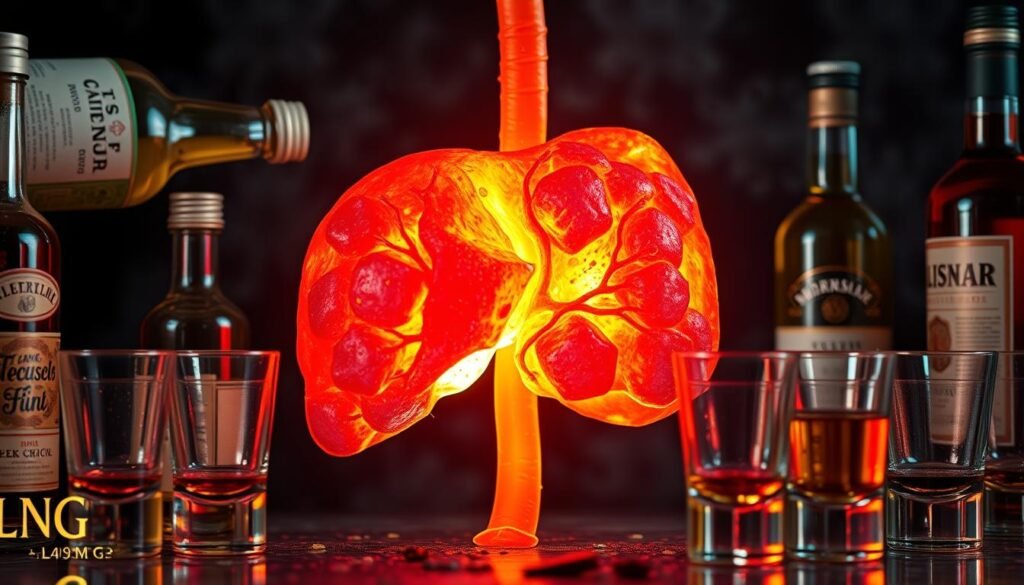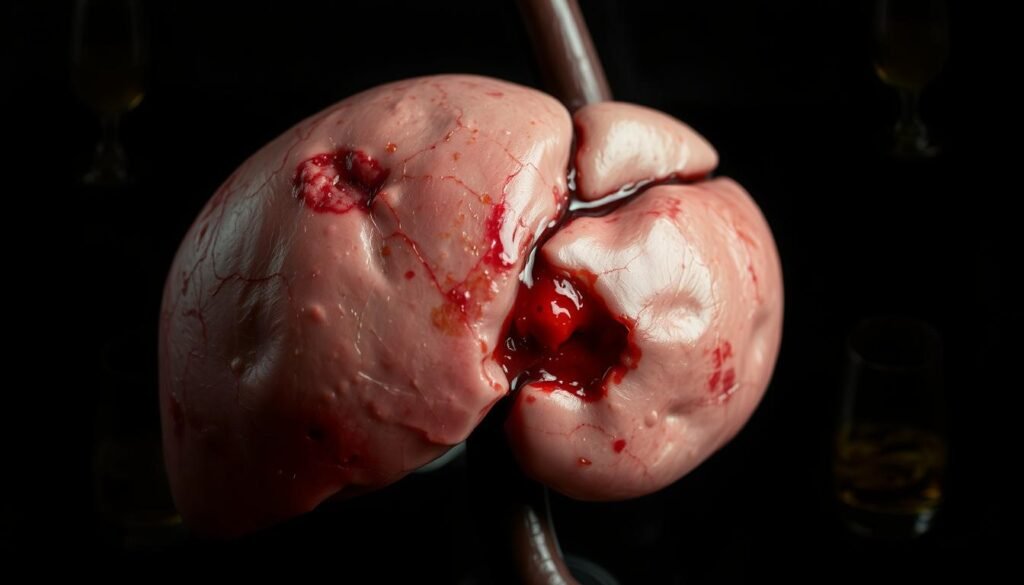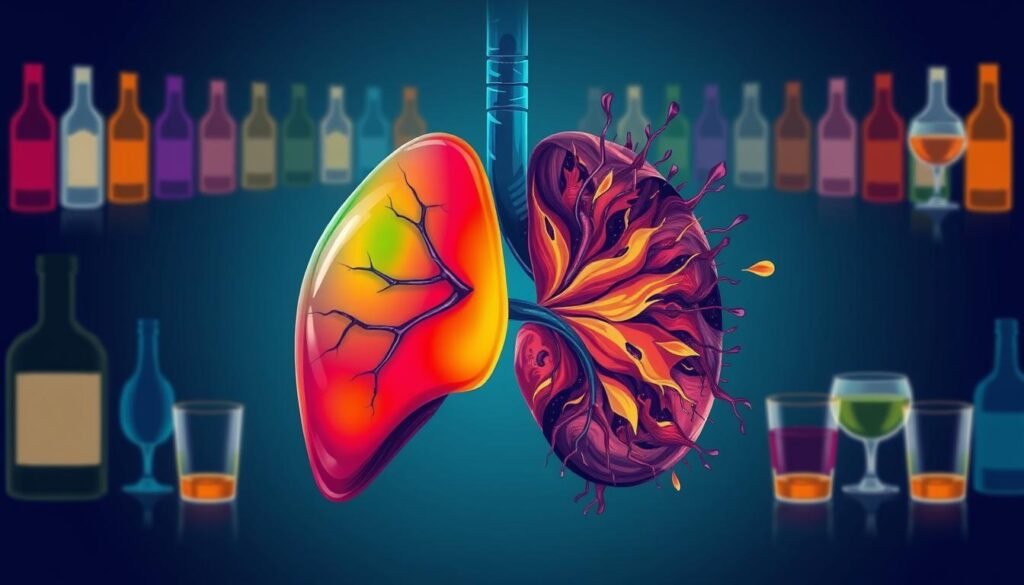Have you ever thought that your casual wine glass could hurt your liver? The impact of Alcohol on Liver Health is major and often overlooked. It can cause serious problems like alcohol-induced liver disease. The liver does a lot for your body, like cleaning the blood and making important proteins. It helps your body run right. But drinking too much can hurt it, leading to conditions like fatty liver, alcoholic hepatitis, and cirrhosis.
Did you know alcohol is behind a lot of liver disease deaths? It’s key for drinkers to know these risks.
Studies show most heavy drinkers don’t think they’re dependent on alcohol. Yet, they could still harm their liver, as noted in this article. It’s important to know how much alcohol is okay. For men, it’s up to two drinks a day; for women, one drink. This story explores how drinking affects your liver. It shows why drinking in moderation is vital.
Key Takeaways
- The liver plays a crucial role in filtering blood and metabolizing nutrients.
- Excessive alcohol consumption can lead to severe liver conditions, such as cirrhosis.
- Many individuals develop liver disease despite not being alcohol dependent.
- Early stages of liver disease can be asymptomatic, complicating early detection.
- Moderate drinking guidelines can significantly reduce health risks associated with alcohol.
The Role of the Liver in the Body
The liver is vital for our health. It does many important jobs that affect our well-being. It processes nutrients from food, creates bile to help with digestion, and stores important vitamins and minerals.
Detoxification is another key role of the liver. It gets rid of harmful substances from our body. This keeps us safe from toxic substances that can come from the environment or our bodies.
The liver can heal itself, which is amazing. But, if we harm it too much, it can’t work properly. Taking care of our liver is crucial. If it gets damaged, our body struggles to perform important tasks. This can lead to severe health issues over time.
| Key Functions of the Liver | Description |
|---|---|
| Metabolism | The liver converts nutrients from food into substances the body can use, playing a critical role in metabolic processes. |
| Detoxification | It filters the blood to remove toxins and other harmful substances, contributing significantly to detoxification. |
| Bile Production | Bile acids produced by the liver help break down fats, facilitating effective digestion. |
| Vitamin and Mineral Storage | The liver stores essential vitamins and minerals, ensuring their availability for bodily functions. |
| Regeneration | The liver’s unique ability to regenerate allows it to recover from damage, though this is limited by the extent of injury. |
What is the Impact of Alcohol on Liver Health?
Drinking too much can harm your liver, a key player in your body’s health. It’s behind serious conditions like fatty liver, alcoholic hepatitis, and cirrhosis. The more and longer you drink, the bigger the risk.
Mostly, adults between 40 and 50 years old see these problems, and men are more at risk. Women can face these issues too, even with less drinking.
Early signs of trouble from drinking include:
- Loss of energy
- Poor appetite
- Weight loss
- Nausea
- Belly pain
- Small red spider-like blood vessels on the skin
Ignoring liver damage can lead to worse issues. Problems like swelling in your legs and belly, yellow skin, bleeding, and confusion can happen. These need quick doctor help.
To check liver health, doctors use blood tests, imaging, and sometimes even a biopsy. To get better, stopping drinking, eating healthy, and doctor visits are key. Medicines might help with symptoms too, aiding liver recovery.
Breaking down alcohol creates harmful stuff like acetaldehyde. This bad actor can hurt liver cells and even mess with DNA, raising cancer risks. Knowing all this shows why stopping or cutting back on drinking early matters a lot.
| Condition | Early Symptoms | Advanced Symptoms | Possible Treatments |
|---|---|---|---|
| Fatty Liver | Fatigue, poor appetite | None usually noted | Lifestyle changes |
| Alcoholic Hepatitis | Nausea, abdominal pain | Jaundice, confusion | Medications, lifestyle changes |
| Cirrhosis | Loss of energy, small red blood vessels | Fluid buildup, impotence | Liver transplant, managing complications |
Understanding Alcohol Metabolism
Alcohol metabolism mainly happens in the liver, which is key for handling and getting rid of alcohol. The liver enzymes, alcohol dehydrogenase (ADH) and aldehyde dehydrogenase (ALDH), change alcohol into acetaldehyde. This step is crucial because acetaldehyde can lead to liver problems and hurt other body tissues.
Everyone’s liver deals with alcohol differently, mostly due to our genes that influence liver enzymes. There are various pathways, like cytochrome P450 2E1 (CYP2E1) and catalase, that help break down alcohol. This means genetics and certain biological pathways impact how toxic alcohol can be in the body.
But acetaldehyde’s danger doesn’t stop at the liver. It can create oxidative stress, forming free radicals that increase the risk of alcoholic liver disease. Research suggests acetaldehyde might also affect the brain, possibly causing issues like clumsiness and trouble remembering. Luckily, the blood-brain barrier usually keeps its brain level low.
Having acetaldehyde in our system shows why drinking responsibly is vital. Drinking too much can overload the liver, leading to serious health problems over time. It’s important to know how alcohol affects the liver and the value of drinking in moderation.
Short-Term Damage to the Liver from Alcohol Consumption
Drinking too much alcohol can harm your liver quickly. This often happens after binge drinking. Binge drinking means downing a lot of drinks in a short period. The liver can only process one ounce of alcohol each hour. That’s about one drink. Drinking more than this can mess up how the liver works. It might not deal with fats right. This can lead to alcoholic fatty liver disease.
Alcoholic hepatitis is one type of liver damage from drinking too much. It makes the liver swell. Signs of this include yellow skin, pain in the abdomen, and feeling confused. These signs show a serious problem. If you keep drinking, it gets even riskier. Not stopping drinking can be deadly, especially if your liver is already inflamed.
Binge drinking can cause big liver problems. It raises the chance of getting liver swelling, cirrhosis, and liver cancer. Knowing how dangerous too much drinking is matters a lot. Drinking less helps keep your liver and you healthier. By watching how much you drink, you can take better care of yourself.

Long-Term Damage Caused by Alcohol
Drinking a lot over many years can hurt your liver. This can lead to liver diseases from alcohol. At first, you might get fatty liver, but it can get worse. It could become alcoholic cirrhosis, or your liver might even fail. Knowing about these diseases is key to see how serious they are.
Types of Alcohol-Induced Liver Disease
These liver problems from drinking too much alcohol usually happen in three steps:
- Fatty liver: You can often fix this stage by changing how you live and stopping drinking.
- Alcoholic hepatitis: This part means your liver is inflamed and damaged. It can get very bad and might even kill you.
- Cirrhosis: This is the worst stage, with lots of scarring. Your liver can’t work right anymore.
Pathways to Liver Cell Damage
Drinking too much alcohol hurts your liver in several ways. One big problem is oxidative stress. This is when alcohol in your body causes harmful reactions. These reactions damage your liver cells through something called lipid peroxidation. This can lead to scarring and even alcoholic cirrhosis.
Keeping up with drinking lots of alcohol causes inflammation. This makes the liver damage worse. Over time, your liver can’t heal properly. This means long-term damage.
These issues are serious. Nearly 1 in 3 people with fatty liver get alcoholic hepatitis. And about 20% of those who drink a lot will get cirrhosis. To manage these problems, you often need to stop drinking entirely. You might also need to change your diet or get medical help. Some people might even need a new liver.
| Type of Liver Disease | Characteristics | Risks |
|---|---|---|
| Fatty Liver | Reversible with abstinence | Potential progression to hepatitis |
| Alcoholic Hepatitis | Increased inflammation and cell death | High mortality rate (up to 33%) |
| Cirrhosis | Severe scarring, irreversible damage | Liver failure, increased risk of cancer |
Acute Alcohol-Related Hepatitis
Acute alcoholic hepatitis is a severe result of drinking too much alcohol for a long time. People with this condition often show serious symptoms. This prompts the need for medical help. Knowing the symptoms, risks, and causes is vital, especially because this illness can lead to death if drinking continues.
Symptoms and Risks
Those with acute alcoholic hepatitis may face liver swelling, jaundice, fever, and belly fluid buildup (ascites). These symptoms warn of major liver harm. It highlights the need for prompt treatment. The risk of getting this condition increases with:
- Regular heavy drinking, typically seven or more drinks daily for 20 years.
- Being female; women are more likely to develop it than men.
- Obesity, which raises the chance of liver issues.
- A genetic factor that affects liver health.
- Some racial groups face a higher risk, including Black and Hispanic people.
Binge drinking also boosts the risk. For men, this means five plus drinks in two hours; for women, four plus. This condition’s complications are serious and include:
- Esophageal varices
- Ascites
- Hepatic encephalopathy
- Kidney failure
- Cirrhosis
To prevent acute alcoholic hepatitis, drink in moderation or not at all. People with this illness must stop drinking. This helps the liver heal and lowers the risk of liver failure or death. For more on alcohol-related liver issues, see this resource.

Cirrhosis: The Advanced Stage of Liver Damage
Cirrhosis is the late stage of liver disease, resulting from long-term damage. This could be from alcohol use or viral infections. In early stages, there aren’t always symptoms. So, people might not know they have it until it’s quite serious. It’s important to know the signs of cirrhosis early. This way, doctors can help slow down the disease.
Causes and Symptoms of Cirrhosis
Many things can lead to liver cirrhosis. This includes long-lasting hepatitis B or C, too much alcohol, and exposure to harmful substances. Those who are overweight or have fatty liver disease are also at risk. The common symptoms are being very tired, not feeling hungry, swelling in the belly, and jaundice, where the skin and eyes turn yellow.
- Fatigue
- Loss of appetite
- Swelling in the abdomen due to fluid accumulation
- Jaundice, characterized by yellowing of the skin and eyes
Advanced cirrhosis can lead to serious health issues. Portal hypertension is one of them, which might need medical procedures or blood transfusions. This stage also raises the chance of getting liver cancer. Most liver cancers come from cirrhosis.
Liver transplant might be an option for those with very bad liver damage. Right now, about 2% of people in America have liver disease. This makes them more likely to get cirrhosis. Stopping alcohol and avoiding toxins are key treatments for related liver problems.
Knowing these facts helps people seek treatment sooner. Seeing a doctor regularly is important for keeping an eye on liver health. For more info on liver diseases, check the Liver Foundation website.
| Risk Factors | Potential Complications | Treatment Options |
|---|---|---|
| Chronic hepatitis B | Portal hypertension | Specific procedures to manage complications |
| Chronic hepatitis C | Liver cancer | Liver transplantation |
| Alcohol abuse | Liver failure | Elimination of alcohol and toxins |
| Obesity | Ascites (fluid buildup) | Medication and lifestyle changes |
The Connection Between Alcohol Addiction and Liver Health
Alcohol addiction harms liver health, leading to many liver diseases. The liver breaks down alcohol, so it’s hurt by too much drinking. About 35% of people with alcohol addiction will get advanced liver disease.
Too much drinking is a top cause of death, with 3.3 million deaths in 2012. Drinking a lot, especially with liver inflammation, has a death rate over 50%. Keeping the liver healthy is key for battling addiction. Without stopping alcohol, the liver damage can’t be fixed.

It’s important to address mental health to recover from alcohol addiction. Many drink to handle emotional issues. Adding mental health support can greatly help in overcoming liver disease.
There’s no specific cure for alcoholic liver disease yet. But knowing how alcohol addiction and liver disease are connected can help find good ways to help. For recovery, not drinking lets the liver heal. This shows why treating both mental and body health is important.
| Aspect | Impact |
|---|---|
| Alcohol Addiction | Increased likelihood of liver disease development |
| Mortality Rate in Acute Hepatitis | Greater than 50% for active drinkers |
| Advanced Liver Disease Among Problem Drinkers | Approximately 35% will develop |
| Recovery Potential | Possible with months of sobriety |
People facing mental and alcohol issues should know managing drinking is key for liver health. Learning how alcohol affects the body helps make better choices. For more details on alcohol and liver health, click here.
Strategies for Protecting Liver Health
Keeping your liver healthy needs a mix of good habits. One major point is to drink alcohol in moderation, as following health advice helps avoid alcohol-related diseases. Adding smart lifestyle choices also boosts liver function and your overall health.
Moderation and Public Health Guidelines
Health experts recommend that women have no more than one drink a day, and men should stick to two. Staying within these limits can cut down the risks of liver damage. It also lessens the chance of getting alcohol liver disease (ALD), which causes many liver cirrhosis cases in the U.S.
Besides moderate drinking, you can try other methods to keep your liver in top shape:
- Maintain a healthy weight with proper diet and exercise.
- Drink plenty of water, especially at parties where alcohol is present.
- Eat liver-friendly foods like avocado and asparagus to help your liver recover after drinking.
- Cut back on high sugar, salt, and fatty foods to prevent liver damage.
- Rest well after parties to give your liver time to heal.
- Vaccinate against Hepatitis A and B to avoid extra liver stress.
By following these tips and drinking in moderation, you can improve your liver health. This way, you lower the risk of severe problems from too much alcohol.
Conclusion
Knowing how alcohol affects liver health is key to stop problems before they start. Reports show Alcohol-Related Liver Disease (ALD) is big trouble, hitting about 1 in 20 adults in the U.S. Sadly, deaths from liver issues linked to drinking have shot up since 2020.
Liver health is super important, with many liver disease deaths being preventable. By choosing to drink less and live healthier, we can cut down alcohol risks. Understanding the impact of our drinking habits on liver health can lead to better choices.
We must take care of our livers to fight against ALD. This means spotting the dangers and choosing not to drink too much. For tips on keeping your liver healthy, check out this informative resource. It’s crucial to know how drinking affects liver health for a healthier tomorrow.